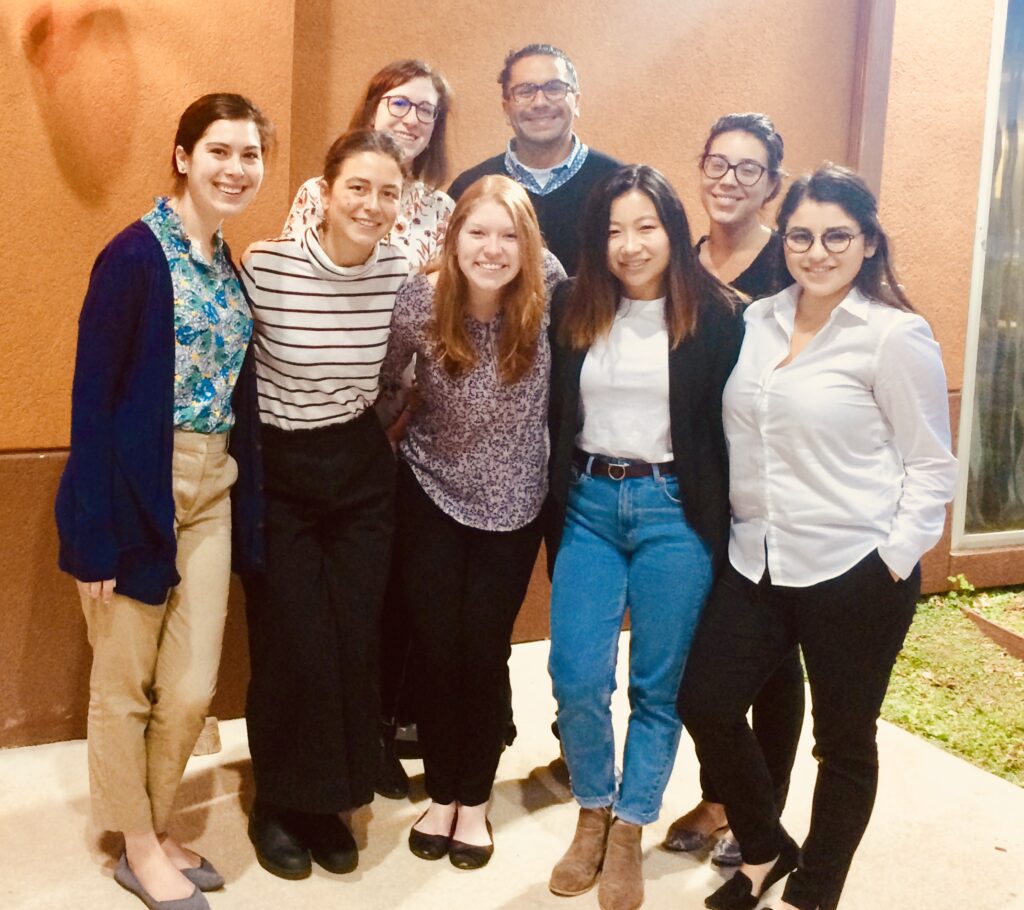This website uses cookies
We use cookies to ensure that we give you the best experience on our website. If you continue to use this site we will assume that you are happy with it.
This January, two groups of Cornell Law students and professors provided free legal services to over 100 people from Guatemala, Honduras, El Salvador, Mexico, and South America seeking asylum at the U.S.-Mexico border. The groups included Diana Caraveo Parra ’20, Lizbeth Cordova ’19, Victoria Inojosa ’19, Linda Lin ’21, Hillary Rich ’19, Emily Szopinkski ’20, Arielle Wisbaum ’20, Jordan Manalastas ’15 (clinical teaching fellow), alumnus Carlos Calderon ’12, and professors Beth Lyon and Jaclyn Kelley-Widmer.

The group poses for a picture at the end of their trip.
The first group traveled to the isolated town of Dilley, Texas, home to the South Texas Family Residential Center, the largest family immigration detention facility in the country, which can hold up to 2,400 women and children.
From January 6–12 they participated in the Dilley Pro Bono Project, which organizes groups of volunteer lawyers and law students to assist the pro bono legal team at the detention center with representing immigrant mothers and children who are often fleeing extreme violence in their home countries.
At the detention center, women are interviewed by asylum officers to determine if they will pass a Credible Fear Interview. In these interviews, women must explain why they are afraid to return to their home countries. If a woman’s claim is deemed a “credible fear,” she is allowed to leave the detention center and join her family or friends living in the United States while she waits to present her asylum case in front of an immigration judge.
The team of six Cornell Law students and one alumnus who traveled to Dilley was led by Jaclyn Kelley-Widmer, an assistant clinical professor of law. Every morning, the team would break into pairs and meet with detained mothers individually to prepare them for their interviews by listening to their stories and helping them to articulate the “credible fear” that they would later have to explain to the asylum officer.
Overall, the Dilley Pro Bono project has a success rate of 98 percent, meaning that nearly all of the women it advises pass their CFIs and can be released until their asylum cases are brought to court. During the week that Cornell Law students were in Dilley, the success rate was 100 percent.
From January 13-16, a second group worked in Tijuana, Mexico, with Al Otro Lado, an organization that provides direct legal services to refugees seeking asylum. This group, which included four students from the first group plus a new student, was supervised by Jordan Manalastas ’15, a clinical teaching fellow, and Professor Beth Lyon, the assistant director for Clinical, Advocacy and Skills Programs and director of the Farmworker Legal Assistance.
The Cornell Law team in Tijuana conducted intake and counseled adults and unaccompanied children on the merits of their claims, helping them to identify evidence and decide whether or not to seek asylum.
The team prevented family separation by helping parents find temporary guardians for their U.S.-citizen children and prepare written declarations withholding permission to be separated from their non-U.S. citizen children. The team was also responsible for identifying “MVPs” (“most vulnerable people”), such as LGBT asylum seekers, disabled people, and individuals experiencing threats or actual violence in Tijuana.
In Dilley, the group participated in what were called “Charlas” which were presentations to larger groups of new clients. Kelley-Widmer recalls a memorable experience after giving a “release charla” in which she described to a group of women how they would have to wear an ankle monitor, go to ICE check-ins, and go to immigration court. Then, she says “they formed a line to receive a list of legal services providers in their destinations. Each woman approached me, hope radiating from her as she anticipated her freedom, and said ‘Norte Carolina’ or ‘Los Angeles.’ . . . It was so moving to see these women, who had already been through so much and still had so much ahead of them, feel positive and hopeful at their moment of release from detention.”